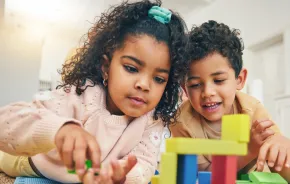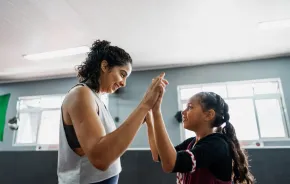
Photo:
Mona Swanson and her son. Photo courtesy of Mona Swanson
We all know the “k-i-s-s-i-n-g song” from our childhoods: “First comes love, then comes marriage, then comes baby in the baby carriage.” But as any adult knows, life doesn’t always happen in such a precise order.
At least 35 percent of American children live with an unmarried parent, according to the Kids Count Data Center. The majority of those parents are mothers.
Many of those mothers decided to push the baby carriage on their own rather than wait around for a partner. Their stories are as vastly different as their reasons for deciding to be a single parent.
Some choose building a career before considering a family. Others separated from their partners after an unplanned pregnancy. All are part of a growing movement of single women going it alone. You might hear them referred to as “choice moms” (single women who proactively decide to become a mom through adoption or conception) or “single by chance” (single women who have an unplanned pregnancy).
Mikki Morrissette, founder of the Choice Moms organization and author of Choosing Single Motherhood: The Thinking Woman’s Guide, says choice moms are women who have usually reached their mid-30s or early 40s. They’re typically financially independent and haven’t found the right partner or have left a partner who doesn’t want children. According to The New York Times, these mothers comprise the only group of unmarried women for whom birthrate has increased in recent years.
“This choice isn’t the right one for everyone, so women have to carefully consider their ability to juggle responsibilities, handle stress, analyze their financial situation and build a network,” Morrissette explains. That said, in her work with choice moms, she’s found the regret she hears most often is “I wish I would have started sooner.”
Morrissette has two “choice kids” of her own. “For many of us, our lives slow down after we have children,” she says. “Our lives become less stressful than they were in our workaholic days.”
For women who become single by chance, the choice is not always a deliberate one. Nearly half of all pregnancies between 2006 and 2008 were unintended; about half of those end in a live birth, according to national nonprofit research organization Child Trends.
Whatever the situation, being a parent alone doesn’t mean being lonely. “While you may be having a child alone, without a partner, you never have to be alone,” says single mom Jennifer Brantley of Bremerton. She recommends support groups where single moms can share ideas, garner support and connect with other women in similar situations. There are also online groups for single moms, including groups on Meetup, Parents Without Partners, Single Moms Support Group, Single Mothers by Choice and Single Mothers.
Morrissette stresses the importance of proactively building up such a support network, which can assist with everything from transportation to babysitting.
“Anyone considering choice motherhood must be able to connect to new people in her community,” says Morrissette. Such a woman, she notes, needs a strong community where she can “find male role models, give herself predictable and emergency breaks from parenting, take advantage of the help of her inner circle [and] create meaningful rituals with others outside of the home.”
As any mom, whatever her situation, can attest, it really does take a village. “Reaching out for support will help you maintain your sanity when things get tough,” Brantley says. “It took me a while to accept that I didn’t have to do it by myself and that accepting help did not make me less of a person.”
In the spirit of finding that village, we spoke with three mothers. Two identify as choice moms, while the third is single by chance. They offer their stories of navigating motherhood.
Meeting the moms
Mona Swanson
Bremerton; 39; adopted son from Russia
Why I chose adoption: “I was a bit of the cliché: a woman in her late 30s, working too much, not in a relationship [and] listening to the biological clock ticking. It’s not that I wanted to go it alone, but I decided that I could go it alone.”
Advantages of being a choice mom: “The choices were all my own. I was the one who decided that adoption was the right path for me, and that journey was filled with my own considerations in mind.”
Struggles of being a choice mom: “The emotional roller coaster of adoption was [also] all my own. I didn’t have a spouse to work through those emotions, and although friends and family were supportive and curious, the depth of the emotion and the complexity of the adoption process became exhausting to explain time after time.”

Anne Ensminger
Seattle; began in vitro fertilization (IVF) at 42
Why I chose IVF: “I was in my early 40s and still single when I realized that the traditional method of having a family wasn’t necessarily going to happen in the linear way I thought it would. So I started exploring the idea of having a child on my own. It was something that felt right for me because I had wanted to be a mom my whole life. I was really scared to tell my family, but they couldn’t have been more supportive. I remember telling my mom and dad that I was thinking about either having a child on my own or adopting, and my dad’s response was something like, ‘We’ve been hoping you would do something like this.’”
Advantages of being a choice mom: “You don’t have to consult with anyone else on how you want to raise your child or compromise on what parenting methods you want to use.”
Struggles of being a choice mom: “On the other hand, you don’t have anyone to bounce things off of or problem-solve with when it comes to questions or concerns about your child. At times it can be a lonely journey, but I’ve never once regretted my decision to become a mom. I wouldn’t trade it for anything.”
Jennifer Brantley
Bremerton; became unexpectedly pregnant at 22
Why I’m a single-by-chance mom: “I remember being newly pregnant by my boyfriend, and driving home from college and thinking, ‘I’m going to be a single mom… It’s just a matter of time.’ That time came when my daughter was a little over a year old, and I made the choice to leave an abusive situation to raise her on my own.”
Advantages of being a single-by-chance mom: “I get to enjoy her all the time; our bond is so strong. Because of her, I have learned what it truly means to love someone unconditionally.”
Struggles of being a single-by-chance mom: “Financial tops the list. Instead of two people joining the efforts, there is only one. Emotional and physical health is probably next. I also feel a lot of pain for my daughter as I work hard to combat her father’s absence so that she will grow up knowing that she has value.”
What do you hope your daughter learns from you as a mom? “Through observation and our many conversations, I hope she will learn how to cope with life. I always try to teach her that life will be full of challenges in different forms, and many times they will be unexpected. Things may not always work out as planned, but with perseverance, one can always survive.”











